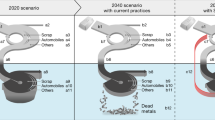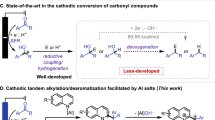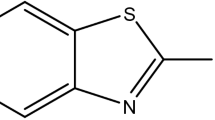Abstract
ON working up the mixture in order to isolate the products of reactions catalysed by anhydrous aluminium chloride, the first step is usually decomposition with an ice-acid mixture1. However, difficulties are often encountered in the separation of the aqueous phase containing the aluminium salts, due to the formation of stable emulsions. This makes the repeated washing of the organic phase necessary to ensure complete extraction of the aluminium salts, a rather tedious operation.
This is a preview of subscription content, access via your institution
Access options
Subscribe to this journal
Receive 51 print issues and online access
$199.00 per year
only $3.90 per issue
Buy this article
- Purchase on SpringerLink
- Instant access to the full article PDF.
USD 39.95
Prices may be subject to local taxes which are calculated during checkout
Similar content being viewed by others
References
Thomas, C. A., “Anhydrous Aluminium Chloride in Organic Chemistry” (Reinhold, New York, 1941).
Rosenmund, K. W., and Schnurr, W., Ann. Chem., 460, 56 (1928).
Furka, A., and Széll, T., Acta Phys. Chem. Szeged (in the press).
Author information
Authors and Affiliations
Rights and permissions
About this article
Cite this article
SZÉLL, T., FURKA, A. A New Method for working up Processing Mixtures containing Anhydrous Aluminium Chloride. Nature 184, 117 (1959). https://doi.org/10.1038/184117a0
Issue date:
DOI: https://doi.org/10.1038/184117a0



